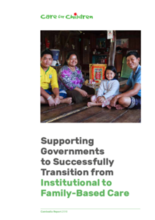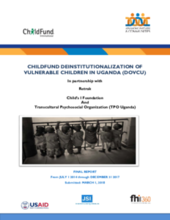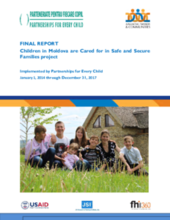Displaying 1301 - 1310 of 2221
In this paper, the authors outline key findings about the educational attainment of children and young people in care as identified by national and international research on this topic.
This ethnographic study of a foster care adoption program shows how board payments elicit commodification anxiety at this local site, and in American culture more broadly.
This report provides a summary of research methodology and details of meetings and data collection from an October 2017 research visit to understand the current child welfare system in Cambodia, in particular the role and function of the Government residential care institutions (RCIs). The report presents findings and recommendations for pathways forward for government-led foster care development.
This final report on the “Deinstitutionalization of Vulnerable Children in Uganda” (DOVCU) project identifies its successes as well as some shortcomings and key learning that is directly relevant to other projects working to support family care for children.
This final report presents key learning, findings, and results of the “Children in Moldova are Cared for in Safe and Secure Families” (Children in Moldova) project.
This study answers the following question: “How does the case-specific context influence the practitioners' decision-making process regarding matching in family foster care?”
This brief guide from Casey Family Programs lays out strategies for recruiting and retaining tribal foster families for American Indian and Alaska Native children, ensuring that indigenous children can stay in their communities.
This paper presents findings from two studies, in England (2012) and Ireland (2013), which explored experiences of unaccompanied refugee minors (URM) in foster care.
This study examined the extent to which (a) maltreatment type and (b) foster care placement were associated with the educational attainment of 337 maltreated adolescents.
The authors of this study sought to better understand the potential strengths and challenges of medical foster care (MFC) as a placement setting for children with chronic critical illness (CCI).




